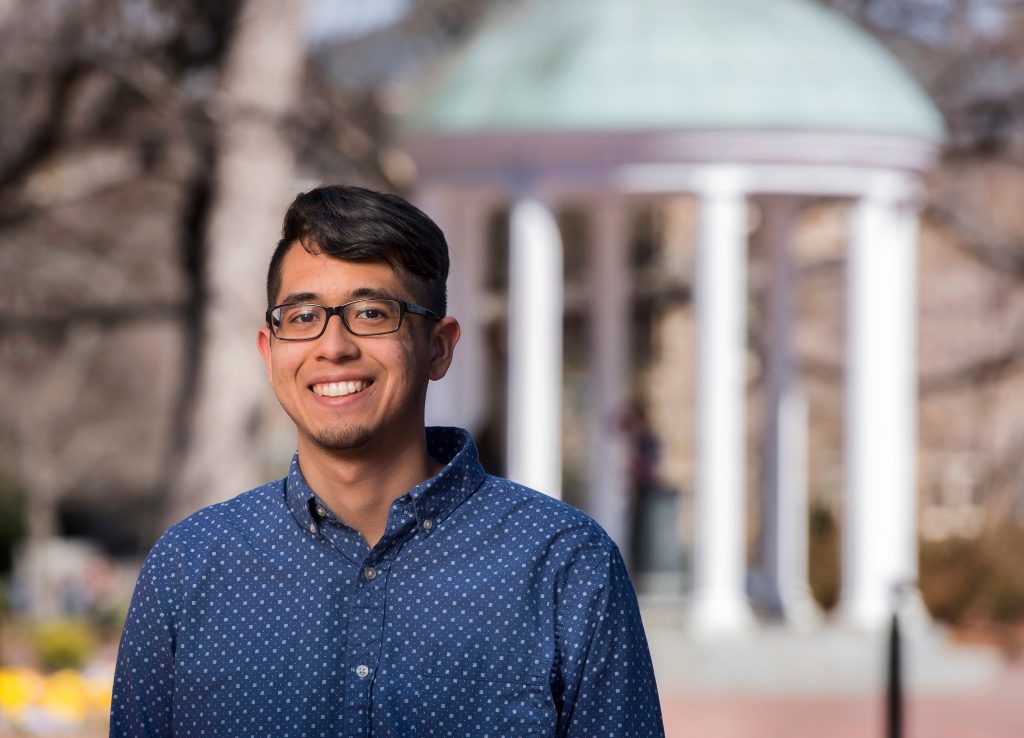
(Jon Gardiner/UNC-Chapel Hill)
By Camila Molina ’17
When Juan Razo ’20 learned about his admittance to Carolina—and that he would be able to afford it—he knew he would study a discipline in healthcare.
“[While] growing up, I experienced the positive change a health care provider can have in a community, and especially to the underrepresented communities,” Razo said.
Razo is a first-year student in the Doctor of Pharmacy program at the UNC Eshelman School of Pharmacy. Becoming a leader in the healthcare field is his way of giving back to the community that cared for him and his family in a local health care clinic for underserved families.
Razo is a first-generation American and first-generation college student. His parents moved to the U.S. in the late 80s and the only items they owned were the clothes on their backs. He was born in Chapel Hill and raised in Durham, North Carolina.
Although Razo maintained competitive grades at Charles E. Jordan High School, the notion of eventually attending college was uncertain because he didn’t know if his parents could afford it or if he would qualify for financial aid.
“From a young age my parents stressed to me the importance of higher education and I knew that I eventually wanted to go to college,” Razo said.
When he decided to apply to colleges, he chose in-state [public] schools, with Carolina as his first choice, as high tuition costs were a hardship for his family. He received notification of his admittance to Carolina in mid January his senior year as he sat in class. He stepped out of the classroom to call his family and celebrate. But still, they weren’t sure if they could afford it.
During a car ride with friends that February, Razo received an email notifying him he was a finalist in the selection for the Pogue Scholarship, a four-year, merit-based scholarship with an emphasis on diversity. Undergraduate students that apply for early action are automatically considered for the Pogue Scholarship and finalists are selected for an interview.
“When I received the news that I was awarded the Pogue Scholarship, my dream suddenly became a reality and ultimately solidified my decision to come to Carolina.”
“When I received the news that I was awarded the Pogue Scholarship, my dream suddenly became a reality and ultimately solidified my decision to come to Carolina.”
Razo completed two years as a chemistry major, then applied and was accepted into the UNC Eshelman School of Pharmacy—a rare accomplishment for an undergraduate—to pursue a doctor of pharmacy degree.
When he changed to the graduate program, staying at Carolina was again uncertain, as the Pogue Scholarship was only for undergraduates. But Holley Nichols, assistant director in the Office of Scholarships and Student Aid, and Pamela Joyner, executive associate dean of professional education in the pharmacy school, found a way to make an exception for him.
“[The Pogues’] gift has given me the opportunity and skills I need to contribute to our community and society in a meaningful way,” Razo said.
Razo is now working his way through his doctoral program and also works at a cancer research lab to gain hands-on experience as well as some financial support.
“Carolina has allowed me to see a different perspective and approach to the same problem,” Razo said. “I believe in diversity, not just in race and ethnicity, but in diversity of mind, [which] is essential to a great education.”

